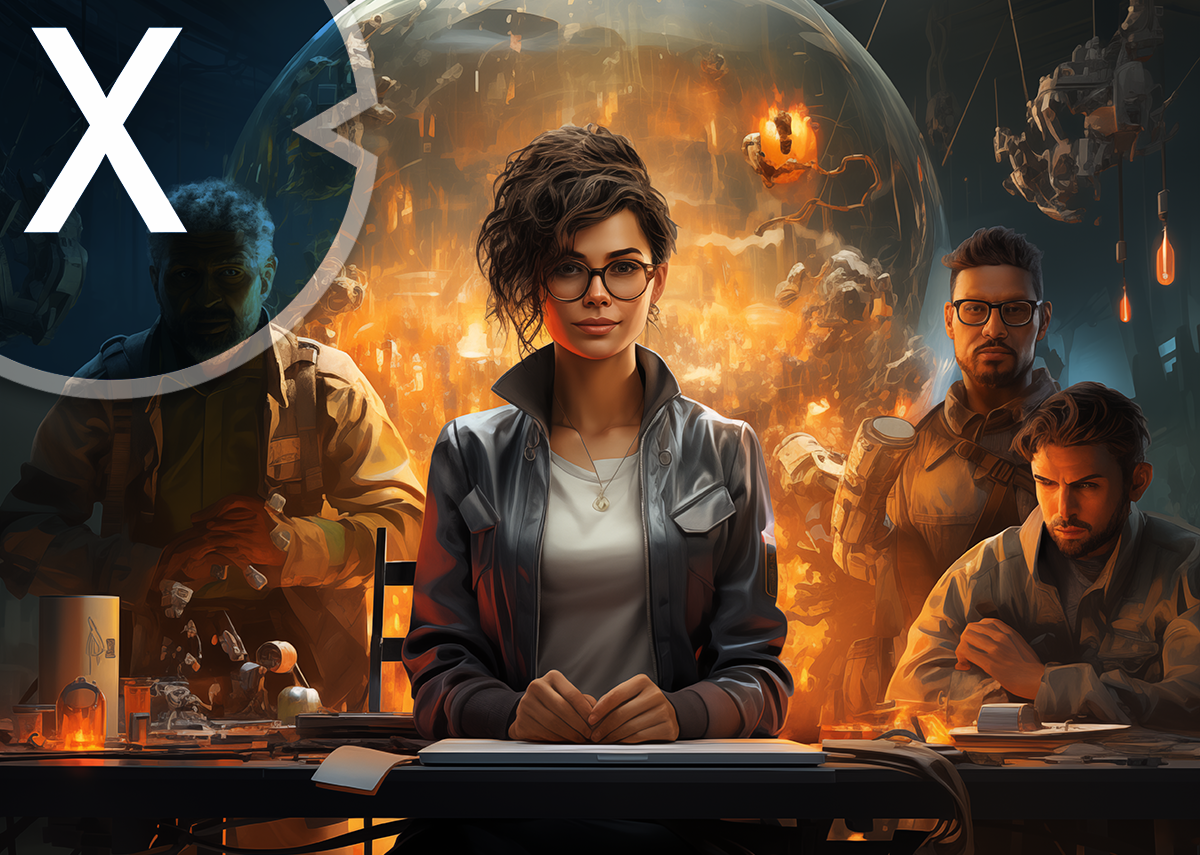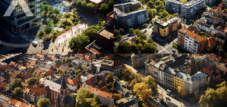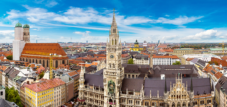Transforming urban mobility in Munich? CRISTAL mini-city buses transform public transport
Xpert pre-release
Language selection 📢
Published on: September 19, 2025 / Updated on: September 19, 2025 – Author: Konrad Wolfenstein

Transformation of urban mobility in Munich: CRISTAL mini city buses transform public transport – Image: Lohr Group
Clean and quiet in Munich city centre - With the CRISTAL mini-city bus on route 167 from 16 September 2025
Munich is now testing minibuses that can be coupled like trains – the solution for the “last mile”?
Munich Transport Company is ushering in a new era of urban mobility with the innovative CRISTAL minibus. Since September 16, 2025, the French electric minibuses have been operating on route 167 in Hadern on a trial basis, demonstrating a pioneering concept: modular, detachable vehicles that can flexibly adapt to changing passenger needs.
Suitable for:
- Urban areas and the future of inner cities: Lohr's Cristal transport system as a solution for sustainable mobility and urban development
The technology behind the innovation
The CRISTAL from Lohr Industrie represents a significant advance in sustainable urban transport technology. The French company, based near Strasbourg, developed a fully electric, modular shuttle system that has been successfully deployed for years in various French cities, including Saverne in Alsace, Ajaccio in Corsica, and Avignon in Provence.
The CRISTAL's technical specifications are impressive in their practicality: With a range of 120 to 170 kilometers and a top speed of 50 kilometers per hour, the system is ideal for urban use. The batteries can be fully charged within 2.5 hours, while a 50 percent charge is achieved in just one hour. With a slope climbing capability of 20 percent, the system effortlessly masters even the topographical challenges of urban landscapes.
The revolutionary feature of the CRISTAL lies in its automated mechanical coupling system. The individual modules can be coupled or separated in less than two minutes. A convoy can consist of one to four vehicles and carry up to 64 people. This flexibility makes it possible to serve different urban areas simultaneously and adjust capacity as needed.
From Barcelona to Zurich: What Germany is learning from the global shuttle trend
Munich's pilot project in Hadern
The test project in Munich demonstrates the practical application of this innovative technology. The CRISTAL buses operate as route E167 on a section of the existing route 167 between the Waldfriedhof cemetery and Großhaderner Straße. At the Großhaderner Straße stop, the three buses split up: one continues to the Am Hedernfeld stop, the other to Blumenau. On the return journey, the vehicles reconnect at Haderunstraße and travel together to the Waldfriedhof cemetery.
Each bus can accommodate up to ten passengers, allowing the three-bus combination to transport a total of 30 passengers. The vehicles are fully accessible and feature automatic electric ramps for people with reduced mobility, as well as wheelchair access. This feature makes them particularly valuable for connecting suburban areas, where elderly people and those with mobility impairments often live.
Strategic importance for the transport transition
The CRISTAL project in Munich is part of a broader strategy to electrify public transport. The MVG has already put over 100 electric buses into operation and aims to fully electrify its bus fleet by 2035. With this goal, Munich is making an important contribution to air quality and noise reduction in the city.
The small electric buses address a specific problem in public transport: the efficient service of suburban areas and narrow neighborhoods where large buses cannot operate or are not profitable due to low utilization. This concept is also scheduled to be deployed between Neuaubing and Freiham on the new route 152 starting in early 2026.
Suitable for:
- Smart City: Innovative concepts for transport and urban logistics – distribution of goods and supply chains in the city
Europe-wide developments in electromobility
The introduction of CRISTAL buses in Munich fits into a European trend toward the electrification of public transport. According to recent studies, the share of electric buses in new registrations in the EU rose from 1.6 percent in 2018 to 4.3 percent in 2019, reaching significantly higher levels in 2020. Worldwide, 480,000 buses were already electric in 2020, and this number is growing continuously.
Cities like London, with over 500 electric buses, Paris with a similarly sized fleet, and Leicester, with plans for full electrification by 2030, demonstrate the Europe-wide transformation. German cities like Hamburg, Berlin, and Stuttgart are also investing heavily in electric bus fleets and contributing to improving urban air quality.
The future of autonomous systems
The CRISTAL system is already paving the way for the next stage of development: autonomous driving. According to the manufacturer, the first shuttle-sized driverless vehicles are expected to be type-approved and ready for series production as early as 2027/2028. Autonomous buses could significantly reduce operating costs in public transport and enable improved service at the same price.
Various projects in Germany are already testing autonomous shuttle systems. The RABus project in Baden-Württemberg successfully tested autonomous vehicles in Mannheim and Friedrichshafen. In the Rhine-Main region, the KIRA project is testing autonomous vehicles for public transport at Level 4 automation with passengers for the first time in Germany.
🎯🎯🎯 Benefit from Xpert.Digital's extensive, fivefold expertise in a comprehensive service package | R&D, XR, PR & SEM

AI & XR 3D Rendering Machine: Fivefold expertise from Xpert.Digital in a comprehensive service package, R&D XR, PR & SEM - Image: Xpert.Digital
Xpert.Digital has in-depth knowledge of various industries. This allows us to develop tailor-made strategies that are tailored precisely to the requirements and challenges of your specific market segment. By continually analyzing market trends and following industry developments, we can act with foresight and offer innovative solutions. Through the combination of experience and knowledge, we generate added value and give our customers a decisive competitive advantage.
More about it here:
CRISTAL in Munich: Test for autonomous, barrier-free shuttles
Challenges of the last mile
CRISTAL technology addresses one of the biggest logistical and transportation policy problems facing modern cities: efficiently managing the first and last mile. In sparsely populated areas, traditional bus and train lines run less frequently, and the network of stops is limited. On-demand services can offer a solution by offering customized departure times on request, including at additional, virtually defined stops.
Shared minibus rides that can be booked via app can significantly improve mobility options and reduce dependence on private cars. One in three local transport companies in Germany already offers flexible minibuses that operate on demand. This development demonstrates the great potential for a transport transition, even in rural areas.
Suitable for:
Economic and ecological benefits
The electrification of urban mobility brings both economic and ecological benefits. While electric vehicles often have higher initial costs than diesel vehicles, a comprehensive total cost of ownership analysis shows that they are generally cheaper over their entire lifespan, especially in the stop-and-go traffic of urban areas.
MVG's 100 electric buses potentially avoid nearly 60,000 tons of CO2 emissions over their lifetime. Such savings contribute significantly to achieving climate targets while simultaneously improving air quality in cities.
Integration into existing transport systems
A key success factor for innovative mobility solutions like the CRISTAL is their integration into existing transport systems. As a MaaS solution, the vehicles complement collective mass transit and can be operated intermodally. They can be deployed for new routes or supplement the existing network, both in scheduled and on-demand operation.
Integration into existing fare, ticket, and information systems is crucial. In Munich, test rides on the CRISTAL buses are free during the trial period, which is intended to promote acceptance and gather valuable experience for later, regular integration.
International perspectives and comparisons
The development of urban mobility is a global phenomenon. Cities around the world are experimenting with various approaches to improving their transportation systems. In France, detachable electric buses have already proven successful in several cities. Barcelona, Zurich, and Valence are also testing autonomous electric shuttles.
This international development demonstrates that, with the CRISTAL project, Munich is part of a global movement toward sustainable urban mobility. The insights gained can not only benefit the Bavarian capital but also serve as a model for other German and European cities.
Social impact and accessibility
An important aspect of CRISTAL technology is its impact on social participation. The vehicles' complete accessibility enables people with limited mobility to participate in public life. Ingrid Appel from the Munich Senior Citizens' Advisory Council described the service as valuable, especially for people with walkers.
Flexible service to suburban areas can contribute to reducing social inequality by providing better mobility for people without their own car. This is particularly important for older people, young people, and low-income households who often rely on public transport.
Technological development and innovation
CRISTAL technology represents just one building block in the development of intelligent transport systems. Future developments are expected to bring even greater interconnection between various mobility options. Mobility hubs, as central transport hubs, could enable efficient switching between different modes of transport.
The integration of artificial intelligence and advanced sensor technology will further increase the efficiency of autonomous systems. Dynamic load management for charging infrastructure will help make the electrification of transport cost-effective.
Political framework and funding
The successful introduction of innovative mobility solutions depends significantly on a supportive political framework. The Munich CRISTAL project is supported by the City of Munich's Mobility Department and financed with funds allocated by the City Council in August 2025.
At the federal level, the government promotes alternative drive systems in public transport through various programs. The EU's Clean Vehicles Directive stipulates that at least 45 percent of all newly purchased buses must be equipped with low-emission alternative drive systems between 2021 and 2025.
CRISTAL in Munich: Will modular e-buses rethink the city?
The CRISTAL pilot project in Munich is more than just a test of new technology—it's a building block for the transport transition in German cities. The insights gained will not only be valuable for the future development of Munich's public transport system, but can also help other cities plan similar projects.
The combination of electrification, modularity, and planned automation makes the CRISTAL system a promising approach for urban mobility of the future. If the system proves successful in trial operation, it could become an important addition to public transport and help reduce dependence on private cars.
The test operation in Munich will run until the end of October 2025. The findings from this project will show whether the modular electric buses truly have the potential to sustainably transform urban mobility and make an important contribution to the transport transition.
Advice - planning - implementation
I would be happy to serve as your personal advisor.
Head of Business Development
Advice - planning - implementation
I would be happy to serve as your personal advisor.
contact me under Wolfenstein ∂ Xpert.digital
call me under +49 89 674 804 (Munich)


























